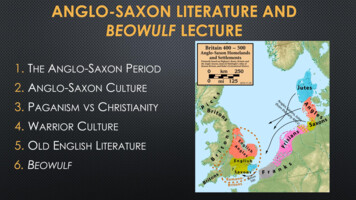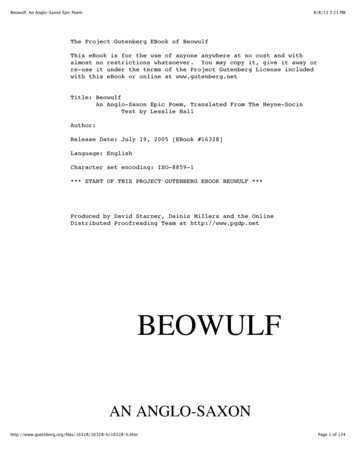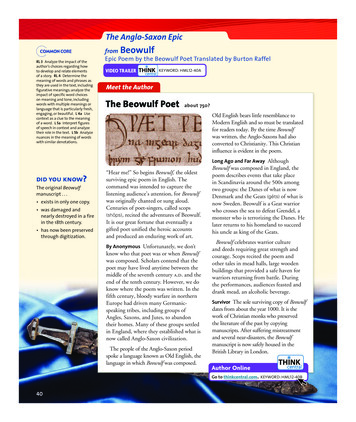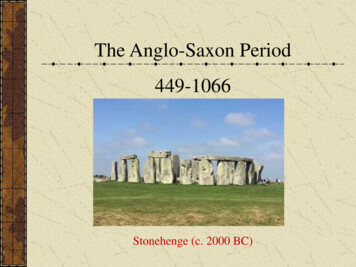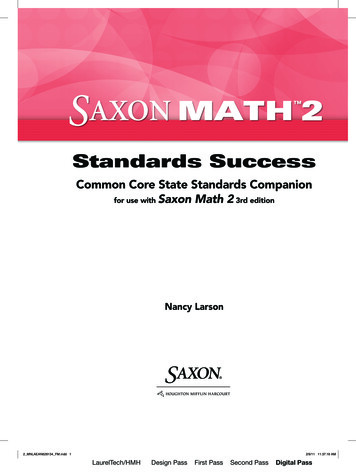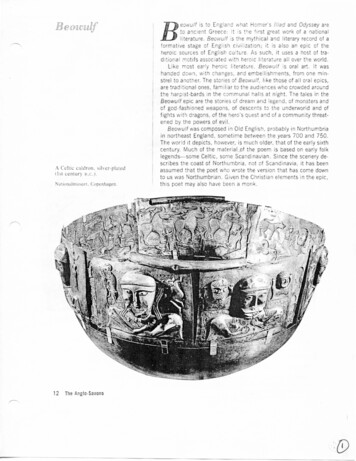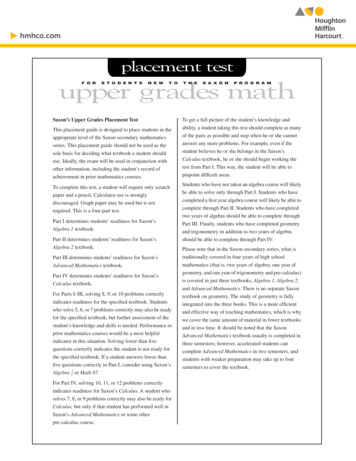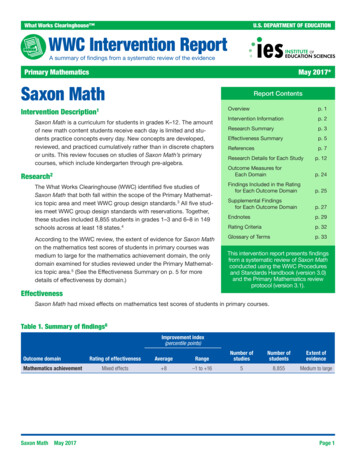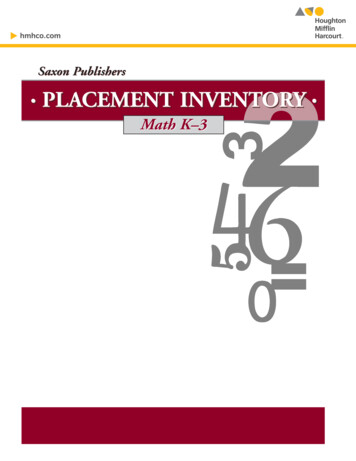
Transcription
BEOWULFAN ANGLO-SAXON EPIC POEMTRANSLATED BYJOHN LESSLIE HALL (1892)EDITED AND COMPILED BY RHONDA L. KELLEYFIGURE 1 THE FIRST FOLIO OF THE HEROIC EPIC POEM BEOWULF, WRITTEN PRIMARILY IN THE WEST SAXON DIALECT OFOLD ENGLISH. PART OF THE COTTON MS VITELLIUS A XV MANUSCRIPT CURRENTLY LOCATED WITHIN THE BRITISHLIBRARY. THIS IS A DIGITAL PHOTOGRAPHIC COPY OF THE FOLIO. 1This file has been provided by the British Library from its digital collections.It is also made available on a British Librarywebsite. Via Wikimedia Commons. Web. 26 May 2014.1
TABLE OF CONTENTSTHE STORY. . 4BEOWULF. . 6THE LIFE AND DEATH OF SCYLD. . 6SCYLD’S SUCCESSORS.—HROTHGAR’S GREAT MEAD-HALL. . 8GRENDEL THE MURDERER. .10BEOWULF GOES TO HROTHGAR’S ASSISTANCE. (Summary and excerpt) .13THE GEATS REACH HEOROT. (Summary) .14BEOWULF INTRODUCES HIMSELF AT THE PALACE. (Summary/Excerpt) .14HROTHGAR AND BEOWULF. (Summary/Excerpt) .15HROTHGAR AND BEOWULF.—Continued. (Summary) .17UNFERTH TAUNTS BEOWULF. .17BEOWULF SILENCES UNFERTH.—GLEE IS HIGH. (Summary/Excerpt).19ALL SLEEP SAVE ONE. .21GRENDEL AND BEOWULF. .23GRENDEL IS VANQUISHED.26REJOICING OF THE DANES. (Summary/Excerpt) .27HROTHGAR’S GRATITUDE. .28HROTHGAR LAVISHES GIFTS UPON HIS DELIVERER.28BANQUET (continued).—THE SCOP’S SONG OF FINN AND HNÆF. (Summary / Excerpt).30THE FINN EPISODE (continued).—THE BANQUET CONTINUES. (Summary / Excerpt) .30BEOWULF RECEIVES FURTHER HONOR.30THE MOTHER OF GRENDEL. .31HROTHGAR’S ACCOUNT OF THE MONSTERS. .33BEOWULF SEEKS GRENDEL’S MOTHER.34BEOWULF’S FIGHT WITH GRENDEL’S MOTHER. .37BEOWULF IS DOUBLE-CONQUEROR. .39BEOWULF BRINGS HIS TROPHIES.—HROTHGAR’S GRATITUDE.42HROTHGAR MORALIZES.—REST AFTER LABOR. .43SORROW AT PARTING. .45
THE HOMEWARD JOURNEY.—THE TWO QUEENS.45BEOWULF AND HIGELAC. .46BEOWULF NARRATES HIS ADVENTURES TO HIGELAC. .47GIFT-GIVING IS MUTUAL. .47THE HOARD AND THE DRAGON. .47BRAVE THOUGH AGED.—REMINISCENCES.50BEOWULF SEEKS THE DRAGON.—BEOWULF’S REMINISCENCES. .53REMINISCENCES (continued).—BEOWULF’S LAST BATTLE. .55WIGLAF THE TRUSTY.—BEOWULF IS DESERTED BY FRIENDS AND BY SWORD. .60THE FATAL STRUGGLE.—BEOWULF’S LAST MOMENTS. .62WIGLAF PLUNDERS THE DRAGON’S DEN.—BEOWULF’S DEATH. .65THE DEAD FOES.—WIGLAF’S BITTER TAUNTS.67THE MESSENGER OF DEATH.69THE MESSENGER’S RETROSPECT. .71WIGLAF’S SAD STORY.—THE HOARD CARRIED OFF. .73THE BURNING OF BEOWULF. .75GLOSSARY OF PROPER NAMES .77LIST OF WORDS AND PHRASES NOT IN GENERAL USE .81Bibliography .84Gallery .85
THE STORY. 2Hrothgar, king of the Danes, or Scyldings, builds a great mead-hall, or palace, in which he hopes to feast hisliegemen and to give them presents. The joy of king and retainers is, however, of short duration. Grendel, themonster, is seized with hateful jealousy. He cannot brook the sounds of joyance that reach him down in his fendwelling near the hall. Oft and anon he goes to the joyous building, bent on direful mischief. Thane after thane isruthlessly carried off and devoured, while no one is found strong enough and bold enough to cope with themonster. For twelve years he persecutes Hrothgar and his vassals.Over sea, a day’s voyage off, Beowulf, of the Geats, nephew of Higelac, king of the Geats, hears of Grendel’s doingsand of Hrothgar’s misery. He resolves to crush the fell monster and relieve the aged king. With fourteen chosencompanions, he sets sail for Dane-land. Reaching that country, he soon persuades Hrothgar of his ability to helphim. The hours that elapse before night are spent in beer-drinking and conversation. When Hrothgar’s bedtimecomes he leaves the hall in charge of Beowulf, telling him that never before has he given to another the absolutewardship of his palace. All retire to rest, Beowulf, as it were, sleeping upon his arms.Grendel comes, the great march-stepper, bearing God’s anger. He seizes and kills one of the sleeping warriors. Thenhe advances towards Beowulf. A fierce and desperate hand-to-hand struggle ensues. No arms are used, bothcombatants trusting to strength and hand-grip. Beowulf tears Grendel’s shoulder from its socket, and the monsterretreats to his den, howling and yelling with agony and fury. The wound is fatal.The next morning, at early dawn, warriors in numbers flock to the hall Heorot, to hear the news. Joy is boundless.Glee runs high. Hrothgar and his retainers are lavish of gratitude and of gifts.Grendel’s mother, however, comes the next night to avenge his death. She is furious and raging. While Beowulf issleeping in a room somewhat apart from the quarters of the other warriors, she seizes one of Hrothgar’s favoritecounsellors, and carries him off and devours him. Beowulf is called. Determined to leave Heorot entirely purified,he arms himself, and goes down to look for the female monster. After traveling through the waters many hours, hemeets her near the sea-bottom. She drags him to her den. There he sees Grendel lying dead. After a desperate andalmost fatal struggle with the woman, he slays her, and swims upward in triumph, taking with him Grendel’s head.Joy is renewed at Heorot. Congratulations crowd upon the victor. Hrothgar literally pours treasures into the lap ofBeowulf; and it is agreed among the vassals of the king that Beowulf will be their next liegelord.Beowulf leaves Dane-land. Hrothgar weeps and laments at his departure.When the hero arrives in his own land, Higelac treats him as a distinguished guest. He is the hero of the hour.Beowulf subsequently becomes king of his own people, the Geats. After he has been ruling for fifty years, his ownneighborhood is wofully harried by a fire-spewing dragon. Beowulf determines to kill him. In the ensuing struggleboth Beowulf and the dragon are slain. The grief of the Geats is inexpressible. They determine, however, to leavenothing undone to honor the memory of their lord. A great funeral-pyre is built, and his body is burnt. Then amemorial-barrow is made, visible from a great distance, that sailors afar may be constantly reminded of theprowess of the national hero of Geatland.The poem closes with a glowing tribute to his bravery, his gentleness, his goodness of heart, and his generosity.It is the devout desire of this translator to hasten the day when the story of Beowulf shall be as familiar to Englishspeaking peoples as that of the Iliad. Beowulf is our first great epic. It is an epitomized history of the life of theTeutonic races. It brings vividly before us our forefathers of pre-Alfredian eras, in their love of war, of sea, and ofadventure.2Hall, J. Lesslie (John Lesslie). trans. Beowulf: An Anglo-Saxon Epic Poem. Boston: D. C. Heath & co., 1892. Web. 26 May 2014.
My special thanks are due to Professors Francis A. March and James A. Harrison, for advice, sympathy, andassistance.J.L. HALL.
BEOWULF.THE LIFE AND DEATH OF SCYLD.Lo! the Spear-Danes’ glory through splendid achievementsThe folk-kings’ former fame we have heard of,How princes displayed then their prowess-in-battle.Oft Scyld the Scefing3 from scathers4 in numbersFrom many a people their mead-benches tore.Since first he found him friendless and wretched,The earl had had terror: comfort he got for it,Waxed ’neath the welkin,5 world-honor gained,Till all his neighbors o’er sea were compelled toBow to his bidding and bring him their tribute:An excellent atheling!6 After was borne himA son and heir, young in his dwelling,7Whom God-Father sent to solace the people.He had marked the misery malice had caused them,That reaved8 of their rulers they wretched had erstwhileLong been afflicted. The Lord, in requital,Wielder of Glory, with world-honor blessed him.Famed was Beowulf, far spread the gloryOf Scyld’s great son in the lands of the Danemen.So the carle9 that is young, by kindnesses renderedThe friends of his father,10 with fees in abundanceMust be able to earn that when age approacheth“Scyld, their mighty king, in honor of whom they are often called Scyldings. He is the great-grandfather of Hrothgar, soprominent in the poem.” (Hall)4 “enemies, foes” from Anglo-Saxon (AS) sceaþa5 Sky6 “Prince, nobleman.” (Hall)7 A son is born to him, who receives the name of Beowulf—a name afterwards made so famous by the hero of the poem. (Hall)8 Bereft, left without9 Man; the AS is geong guma10 “The ideal Teutonic king lavishes gifts on his vassals.” (Hall)3
Eager companions aid him requitingly,When war assaults him serve him as liegemen:By praise-worthy actions must honor be got’Mong all of the races. At the hour that was fatedScyld then departed to the All-Father’s keepingWarlike to wend him; away then they bare himTo the flood of the current, his fond-loving comrades,As himself he had bidden, while the friend of the ScyldingsWord-sway wielded, and the well-lovèd land-princeLong did rule them. The ring-stemmèd vessel,Bark of the atheling, lay there at anchor,Icy in glimmer and eager for sailing;The belovèd leader laid they down there,Giver of rings, on the breast of the vessel,The famed by the mainmast. A many of jewels,Of fretted embossings, from far-lands brought over,Was placed near at hand then; and heard I not everThat a folk ever furnished a float more superblyWith weapons of warfare, weeds for the battle,Bills and burnies; on his bosom sparkledMany a jewel that with him must travelOn the flush of the flood afar on the current.And favors no fewer they furnished him soothly,Excellent folk-gems, than others had given himWho when first he was born outward did send himLone on the main, the merest of infants:And a gold-fashioned standard they stretched under heavenHigh o’er his head, let the holm-currents bear him,Seaward consigned him: sad was their spirit,Their mood very mournful. Men are not ableSoothly to tell us, they in halls who reside,
Heroes under heaven, to what haven he hied.SCYLD’S SUCCESSORS.—HROTHGAR’S GREAT MEAD-HALL.In the boroughs then Beowulf, bairn of the Scyldings,Belovèd land-prince, for long-lasting seasonWas famed mid the folk (his father departed,The prince from his dwelling), till afterward sprangGreat-minded Healfdene; the Danes in his lifetimeHe graciously governed, grim-mooded, agèd.Four bairns of his body born in successionWoke in the world, war-troopers’ leaderHeorogar, Hrothgar, and Halga the good;Heard I that Elan was Ongentheow’s consort,The well-beloved bedmate of the War-Scylfing leader.Then glory in battle to Hrothgar was given,Waxing of war-fame, that willingly kinsmenObeyed his bidding, till the boys grew to manhood,A numerous band. It burned in his spiritTo urge his folk to found a great building,A mead-hall11 grander than men of the eraEver had heard of, and in it to shareWith young and old all of the blessingsThe Lord had allowed him, save life and retainers.Then the work I find afar was assignedTo many races in middle-earth’s regions,To adorn the great folk-hall. In due time it happenedEarly ’mong men, that ’twas finished entirely,11A great hall where Hrothgar and his retainers can feast.
The greatest of hall-buildings; Heorot12 he named itWho wide-reaching word-sway wielded ’mong earlmen.His promise he brake not, rings he lavished,Treasure at banquet. Towered the hall upHigh and horn-crested, huge between antlers:It battle-waves bided, the blasting fire-demon;Ere long then from hottest hatred must sword-wrathArise for a woman’s husband and father.Then the mighty war-spirit endured for a season,Bore it bitterly, he who bided in darkness,13That light-hearted laughter loud in the buildingGreeted him daily; there was dulcet harp-music,Clear song of the singer. He said that was ableTo tell from of old earthmen’s beginnings,That Father Almighty earth had created,The winsome wold14 that the water encircleth,Set exultingly the sun’s and the moon’s beamsTo lavish their lustre on land-folk and races,And earth He embellished in all her regionsWith limbs and leaves; life He bestowed tooOn all the kindreds that live under heaven.The glee of the warriors is overcast by a horrible dread.So blessed with abundance, brimming with joyance,15“That is, “The Hart,” or “Stag,” so called from decorations in the gables that resembled the antlers of a deer. This hall hasbeen carefully described in a pamphlet by Heyne. The building was rectangular, with opposite doors -- mainly west and east -and a hearth in the middle of th single room. A row of pillars down each side, at some distance from the walls, made a spacewhich was raised a little above the main floor, and was furnished with two rows of seats. On one side, usually south, was thehigh-seat midway between the doors. Opposite this, on the other raised space, was another seat of honor. At the banquet soonto be described, Hrothgar sat in the south or chief high-seat, and Beowulf opposite to him. The scene for a flying (see below,v.499) was thus very effectively set. Planks on trestles -- the “board” of later English literature -- formed the tables just in frontof the long rows of seats, and were taken away after banquets, when the retainers were ready to stretch themselves out forsleep on the benches.” (Gummere, F. B. EStory of the Volsungs and Niblungs. New York: P.F. Collier, 1910. Web. 26 May 2014)13 Grendel14 wlitebeorhtne wang, beautiful land15 joy12
The warriors abided, till a certain one gan16 toDog them with deeds of direfullest malice,A foe in the hall-building: this horrible stranger17Was Grendel entitled, the march-stepper famousWho dwelt in the moor-fens, the marsh and the fastness;The wan-mooded being abode for a seasonIn the land of the giants, when the Lord and CreatorHad banned him18 and branded. For that bitter murder,The killing of Abel, all-ruling FatherThe kindred of Cain crushed with His vengeance;19In the feud He rejoiced not, but far away drove himFrom kindred and kind, that crime to atone for,Meter of Justice. Thence ill-favored creatures,Elves and giants, monsters of ocean,Came into being, and the giants that longtimeGrappled with God; He gave them requital.20GRENDEL THE MURDERER.When the sun was sunken, he set out to visitThe lofty hall-building, how the Ring-Danes had used itFor beds and benches when the banquet was over.Then he found there reposing many a nobleAsleep after supper; sorrow the heroes,Misery knew not. The monster of evilGreedy and cruel tarried but little,Fell and frantic, and forced from their slumbersThirty of thanemen; thence he departedLeaping and laughing, his lair to return to,beganAlternately, “fiend from hell” from AS feond on helle.18 Cain, brother of Abel19 Cain was regarded as the father of all monsters.20 Justice; God is here seen as the origin and giver of all Justice.1617
With surfeit21 of slaughter sallying homeward.In the dusk of the dawning, as the day was just breaking,Was Grendel’s prowess revealed to the warriors:Then, his meal-taking finished, a moan was uplifted,Morning-cry mighty. The man-ruler famous,The long-worthy atheling,22 sat very woful,Suffered great sorrow, sighed for his liegemen,23When they had seen the track of the hateful pursuer,The spirit accursèd: too crushing that sorrow,Too loathsome and lasting. Not longer he tarried,But one night after continued his slaughterShameless and shocking, shrinking but littleFrom malice and murder; they mastered him fully.He was easy to find then who otherwhere looked forA pleasanter place of repose in the lodges,A bed in the bowers. Then was brought to his noticeTold him truly by token apparentThe hall-thane’s hatred: he held himself afterFurther and faster who the foeman did baffle.So ruled he24 and strongly strove against justiceLone against all men, till empty uptoweredThe choicest of houses.25 Long was the season:Twelve-winters’ time torture sufferedThe friend of the Scyldings, every affliction,Endless agony; hence it after becameCertainly known to the children of menSadly in measures, that long against HrothgarExcess, surplusprince23 Retainers, warriors serving under him24 Grendel25 “until idle was standing / The best of hall-houses” (William Morris and A. J. Wyatt, trans. The Tale of Beowulf Sometime Kingof the Folk of the Weder Geats. London: Longman, Green, and Co., 1904. Accessed May 26, 2014.)2122
Grendel struggled:—his grudges he cherished,Murderous malice, many a winter,Strife unremitting, and peacefully wished heLife-woe to lift from no liegeman at all ofThe men of the Dane-folk, for money to settle,No counsellor needed count for a momentOn handsome amends at the hands of the murderer;The monster of evil fiercely did harass,The ill-planning death-shade, both elder and younger,Trapping and tricking them. He trod every night thenThe mist-covered moor-fens; men do not know whereWitches and wizards wander and ramble.So the foe of mankind many of evilsGrievous injuries, often accomplished,Horrible hermit; Heort he frequented,Gem-bedecked palace, when night-shades had fallen(Since God did oppose him, not the throne could he touch,The light-flashing jewel, love of Him knew not).26’Twas a fearful affliction to the friend of the ScyldingsSoul-crushing sorrow. Not seldom in privateSat the king in his council; conference held theyWhat the braves should determine ’gainst terrors unlooked for.At the shrines of their idols often they promisedGifts and offerings, earnestly prayed theyThe devil from hell would help them to lightenTheir people’s oppression. Such practice they used then,Hope of the heathen; hell they rememberedIn innermost spirit, God27 they knew not,“Of this difficult passage the following interpretations among others are given: (1) Though Grendel has frequented Heorot asa demon, he could not become ruler of the Danes, on account of his hostility to God. (2) Hrothgar was much grieved thatGrendel had not appeared before his throne to receive presents. (3) He was not permitted to devastate the hall, on account ofthe Creator; i.e. God wished to make his visit fatal to him. (4) Nor had he any desire to do so.” (Hall)26
Judge of their actions, All-wielding Ruler,No praise could they give the Guardian of Heaven,The Wielder of Glory. Woe will be his whoThrough furious hatred his spirit shall drive toThe clutch of the fire, no comfort shall look for,Wax no wiser; well for the man who,Living his life-days, his Lord may faceAnd find defence in his Father’s embrace!28BEOWULF GOES TO HROTHGAR’S ASSISTANCE. (SUMMARY AND EXCERPT) 29 Hrothgar sees no way of escape from the persecutions of Grendel. Beowulf, the Geat, hero of the poem, hears of Hrothgar’s sorrow, and resolves to go to his assistance. With fourteen carefully chosen companions, he sets out for Dane-land. The vessel sails like a bird. In twenty four hours they reach the shores of Hrothgar’s dominions. They are hailed and challenged by the Danish coast guard who is struck by Beowulf’s appearance.“Never a greater oneOf earls o’er the earth have I had a sight ofThan is one of your number, a hero in armor;No low-ranking fellow30 adorned with his weapons,But launching them little, unless looks are deceiving,And striking appearance. Ere ye pass on your journeyAs treacherous spies to the land of the ScyldingsAnd farther fare, I fully must know nowWhat race ye belong to. Ye far-away dwellers,Sea-faring sailors, my simple opinionThe Christian god.“Woe for that man / who in harm and hatred hales his soul / to fiery embraces; -- nor favor nor change/ awaits he ever. Butwell for him / that after death-day may draw to his Lord, /and friendship find in the Father’s arms!” (Gummere)29N.b. All summaries, excerpts, and headings are from Hall.30 “‘Seld-guma’ is variously rendered: (1) housecarle; (2) home-stayer; (3) common man. Dr. H. Wood suggests a man-at-armsin another’s house.” (Hall)2728
Hear ye and hearken: haste is most fittingPlainly to tell me what place ye are come from.”THE GEATS REACH HEOROT. (SUMMARY) Beowulf courteously replies.oWe are Geats.oMy father Ecgtheow was well-known in his day.oOur intentions towards King Hrothgar are of the kindest.oIs it true that a monster is slaying Danish heroes?oI can help your king to free himself from this horrible creature.The coast-guard reminds Beowulf that it is easier to say than to do.oI am satisfied of your good intentions, and shall lead you to the palace.oYour boat shall be well cared for during your stay here. He again compliments Beowulf. The coast-guard leads them to Heort. The coast-guard, having discharged his duty, bids them God-speed.BEOWULF INTRODUCES HIMSELF AT THE PALACE. (SUMMARY/EXCERPT) The Geats set their arms and armor against the wall.“In warlike equipments. ’Gainst the wall of the buildingTheir wide-fashioned war-shields they weary did set then,Battle-shields sturdy; benchward they turned then;Their battle-sarks rattled, the gear of the heroes;The lances stood up then, all in a cluster,The arms of the seamen, ashen-shafts mountedWith edges of iron: the armor-clad troopersWere decked with weapons.” A Danish hero asks them whence and why they are come. He expresses no little admiration for the strangers. Beowulf replies.
o We are Higelac’s table-companions, and bear an important commission to your prince.Wulfgar, the thane, says that he will go and ask Hrothgar whether he will see the strangers.He thereupon urges his liegelord to receive the visitors courteously.Hrothgar, too, is struck with Beowulf’s appearance.HROTHGAR AND BEOWULF. (SUMMARY/EXCERPT) Hrothgar remembers Beowulf as a youth, and also remembers his father.o Beowulf is reported to have the strength of thirty men.o God hath sent him to our rescue.Wulfgar invites the strangers in.Beowulf salutes Hrothgar, and then proceeds to boast of his youthful achievements.Beowulf spake (his burnie did glisten,His armor seamed over by the art of the craftsman):“Hail thou, Hrothgar! I am Higelac’s kinsmanAnd vassal forsooth; many a wonderI dared as a stripling.31 The doings of Grendel,In far-off fatherland I fully did know of:Sea-farers tell us, this hall-building standeth,Excellent edifice, empty and uselessTo all the earlmen after evenlight’s glimmer’Neath heaven’s bright hues hath hidden its glory.This my earls then urged me, the most excellent of them,Carles very clever, to come and assist thee,Folk-leader Hrothgar; fully they knew ofThe strength of my body. Themselves they beheld meWhen I came from the contest, when covered with goreFoes I escaped from, where five I had bound,The giant-race wasted, in the waters destroyingThe nickers32 by night, bore numberless sorrows,The Weders avenged (woes had they suffered)Enemies ravaged; alone now with Grendel3132YouthSea monster, water demon from AS nicor (niceras nihtes, the water-demons at night).
I shall manage the matter, with the monster of evil,The giant, decide it. Thee I would thereforeBeg of thy bounty, Bright-Danish chieftain,Lord of the Scyldings, this single petition:Not to refuse me, defender of warriors,Friend-lord of folks, so far have I sought thee,That I may unaided, my earlmen assisting me,This brave-mooded war-band, purify Heorot.I have heard on inquiry, the horrible creatureFrom veriest rashness recks not for weapons;I this do scorn then, so be Higelac gracious,My liegelord belovèd, lenient of spirit,To bear a blade or a broad-fashioned target,A shield to the onset; only with hand-gripThe foe I must grapple, fight for my life then,Foeman with foeman; he fain must rely onThe doom of the Lord whom death layeth hold of.I ween he will wish, if he win in the struggle,To eat in the war
Over sea, a day's voyage off, Beowulf, of the Geats, nephew of Higelac, king of the Geats, hears of Grendel's doings and of Hrothgar's misery. He resolves to crush the fell monster and relieve the aged king. With fourteen chosen companions, he sets sail for Dane-land. Reaching that country, he soon persuades Hrothgar of his ability to .
